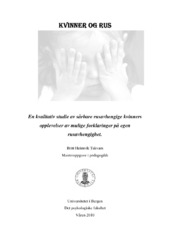| dc.contributor.author | Takvam, Britt | |
| dc.date.accessioned | 2010-07-30T09:13:12Z | |
| dc.date.available | 2010-07-30T09:13:12Z | |
| dc.date.issued | 2010-03-17 | eng |
| dc.date.submitted | 2010-03-17 | eng |
| dc.identifier.uri | https://hdl.handle.net/1956/4011 | |
| dc.description.abstract | Studien er gjennomført ved en rusklinikk i Norge. Den er basert på intervju med fem rusavhengige kvinner. Hensikten med studien er ved hjelp av kvinnenes historier å få mer kunnskap om hvordan man i fremtiden kan gjøre rusforebygging mer treffsikker og relevant overfor sårbare unge jenter. Studien er bygget opp rundt følgende problemstilling: "Hva mener sårbare rusavhengige kvinner er mulige forklaringer på egen rusavhengighet og hvilke erfaringer har kvinnene med offentlige institusjoner i oppveksten?". Det er veldokumentert i tidligere forskning at risikoen for rusavhengighet stiger i takt med sårbarhetsfaktorer i befolkningen. Mitt ønske har vært å få frem de sårbare rusavhengige kvinnenes egne erfaringer, beskrivelser og opplevelser av hva som ligger til grunn for deres rusavhengighet. Empirien er skapt gjennom bruk av kvalitativt forskningsintervju, med fenomenologi og hermeneutikk som et epistemologisk og ontologisk bakteppe. På bakgrunn av funnene som er gjort er Bourdieus teoretiske begreper om habitus, kapital, det sosiale rom, symbolsk makt og kjønn anvendt for å belyse og gi innsikt i det de rusavhengige kvinnene forteller. Gjennom Bourdieus teoretiske perspektiv viser funnene at det er store konsekvenser forbundet med å vokse opp i sosiale rom som skader. Videre fremkommer det at manglende tilførsel av de ulike kapitalene har spilt en viktig rolle i kvinnenes oppvekst. Det kommer også tydelig frem at reprodusering av sosiale ulikheter foregår både i familiens og skolens sosiale rom. Empirien viser også at mangel på inngripen fra det offentlige har hatt en betydning for kvinnenes oppvekst. Denne studien fremhever også betydningen av tilførsel av kapital og endring av habitus når hensikten er å hjelpe sårbare kvinner ut av rusavhengighet. Tilførsel av kapital og endring av habitus er også viktige forebyggingstiltak som kan settes inn når målet er å forhindre at sårbare barn og ungdom begynner å misbruke rus. | en_US |
| dc.description.abstract | This study has been conducted at a clinic for substance abuse in Norway. It is based on interviews with five women with a drug addiction. The intention of the study is, by the women's story, to gain more knowledge on how to make drug prevention more accurate and relevant to young, vulnerable girls. The study is built around the following themes: What does vulnerable drug addicted women feel is possible explanations to their own addiction, and which experiences does the women have with public institutions in their childhood?" It is well documented in previous research that the risk of drug addiction is rising in line with the vulnerability factors in the population. The aim of the study is to bring forth the vulnerable women's own experiences and descriptions of what underlies their addiction. The empirical data is gathered through the use of qualitative research interview with phenomenology and hermeneutics as an epistemological and ontological background. In the light of my findings, Bourdieus theoretical concepts of habitus, capital, symbolic power and sexes, is used to enlighten and give insight to the story which is told by the women. Through Bourdieu's theoretical perspective, the findings show that there are significant consequences associated with growing up in social rooms that damages. Moreover, it emerges that the lack of supply of capital has played an important role in the women's adolescence. It is also clear that the reproduction of social inequalities takes place both in the family and the school's social room. The empirical data also shows that lack of intervention from the public system has had an impact on the women's upbringing. This study points out that the supply of capital and change of habitus is of great importance when the purpose is to help vulnerable women out of addiction. The supply of capital and change of habitus is therefore important prevention measures that can be inserted when the goal is to prevent that vulnerable children and youth begin to abuse drugs. | en_US |
| dc.format.extent | 1850274 bytes | eng |
| dc.format.mimetype | application/pdf | eng |
| dc.language.iso | nob | eng |
| dc.publisher | The University of Bergen | eng |
| dc.subject | Kvinner | nob |
| dc.subject | Rus | nob |
| dc.subject | Sårbarhet | nob |
| dc.subject | Overgrep | nob |
| dc.subject | Svik | nob |
| dc.subject | Habitus | nob |
| dc.subject | Rusavhengighet | nob |
| dc.title | Kvinner og rus. En kvalitativ studie av sårbare rusavhengige kvinners opplevelser av mulige forklaringer på egen rusavhengighet. | nob |
| dc.type | Master thesis | |
| dc.rights.holder | Copyright the author. All rights reserved | |
| dc.rights.holder | The author | eng |
| dc.description.degree | Master i Pedagogikk | |
| dc.description.localcode | PED395 | |
| dc.description.localcode | MAPS-PED | |
| dc.subject.nus | 724112 | eng |
| dc.subject.nsi | VDP::Samfunnsvitenskap: 200::Pedagogiske fag: 280 | nob |
| fs.subjectcode | PED395 | |
